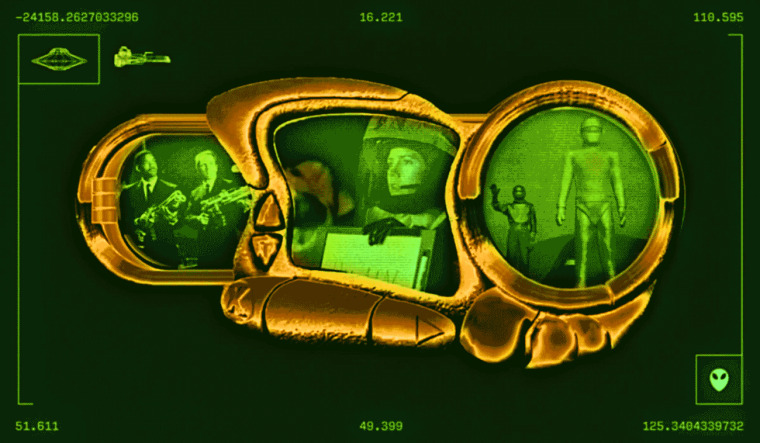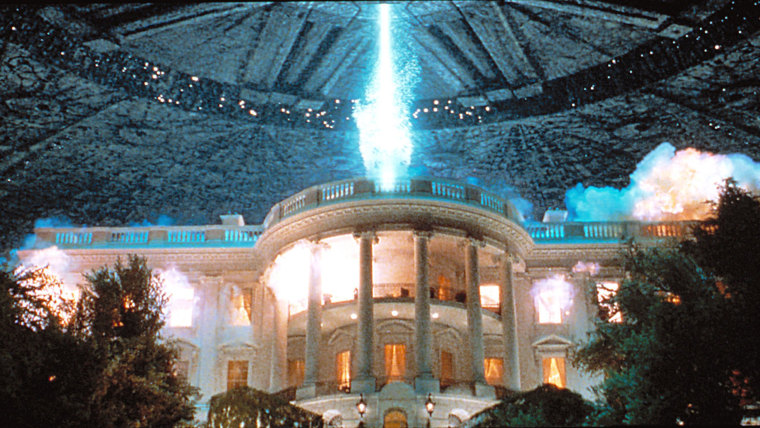The U.S. government is finally starting to publicly acknowledge UFOs. The creator of "The X-Files" has been waiting for this moment for decades.
"It's something I've been interested in for a long time, so to see it make the equivalent of front-page news is a delight," Chris Carter said in a phone conversation this week.
It's a potentially transformative moment for the American public as intelligence agencies prepare to deliver a report to Congress about what they call unidentified aerial phenomena. But it's an especially peculiar time for artists who have long shaped our collective understanding of mysterious flying objects.

Barry Sonnenfeld, the director of all three installments of the original "Men in Black" trilogy, said he feels terrified about what we might learn.
"It's scary. If there are aliens out there, I can't imagine they're nice, and I don't think we deserve to be treated particularly nicely. Let's face it, humans are the virus of the planet," he said.
Sonnenfeld's anxiety befits a man whose autobiography is subtitled "Memoirs of a Neurotic Filmmaker." In the first "Men in Black" film, after all, a cockroach-style invader disguises himself as a farmer and goes on a killing spree.
The idea of UFOs' arriving on Earth has long been linked in public consciousness with "aliens" and refracted through the prism of Hollywood, for better or worse. It's a paradigm that some creators have gleefully embraced and others have tried to thoughtfully subvert.
In the 1950s, "The Day the Earth Stood Still" and "Invasion of the Body Snatchers" channeled Cold War paranoia. In more recent decades scarred by global terrorism, otherworldly visitors laid waste to Washington ("Independence Day"), New York ("The Avengers") and other landmarks.

"The X-Files" went deeper, imagining both paranormal phenomena and a vast government conspiracy to hide the truth about extraterrestrial life.
The show, a 1990s cult hit starring David Duchovny and Gillian Anderson as FBI agents who investigate mysterious occurrences, was partly inspired by what Carter described as the "residue" of Watergate-era distrust of government.
Hollywood's role in shaping public attitudes about UFOs — what is considered socially acceptable dinner party conversation, which accounts of purported sightings are taken seriously — is hard to overstate and difficult to pin down. The mass media's interest in UFOs has often been a double-edged sword, fueling legitimate interest in the topic while sensationalizing it to sell tickets or boost ratings.
Diana Walsh Pasulka, a professor of philosophy and religion at the University of North Carolina, Wilmington, and author of "American Cosmic: U.F.O.s, Religion, Technology," said UFO-themed entertainment can be divided into roughly two categories that have coexisted for decades and sometimes overlap.
In the first are titles in which "the UFO event is revealed to be detrimental to humans," such as "Independence Day" and other violent disaster epics. In the second are projects in which UFO encounters take on a gently philosophical dimension and strange visitors are essentially benevolent, such as Steven Spielberg's "Close Encounters of the Third Kind" and "E.T. the Extra-Terrestrial."

Mark Fergus, a co-writer of the 2011 genre mashup "Cowboys & Aliens," said Hollywood has often stepped in to provide fictional but spiritually resonant explanations for cosmic riddles and national mysteries, such as the "Roswell incident" in 1947. ("Cowboys & Aliens" was co-produced and distributed domestically by Universal Pictures, a unit of NBCUniversal.)
"There's always been a tremendous sense that nobody's adequately explained it all away, to the point where this interest in UFOs lingers in the culture," Fergus said.
Pasulka, however, said she believes that some mass media depictions of UFOs — along with the government's attempts to manage national narratives — have impeded serious study.
"Lots of people think those who believe in UFOs are weirdos and fringe and marginal," she said. "The credible, serious study of UFOs has been impacted by how people who believe in them have been represented in culture."
In other words, mass entertainment has made it easy to dismiss believers as conspiratorial cartoons rather than treat UFOs as potentially pressing matters of scientific inquiry or even national security.
The day after the former Navy pilot David Fravor spotted an unidentified "Tic-Tac-looking object" during training exercises over the Pacific Ocean in 2004, for instance, the crew on his ship used Hollywood shorthand to razz him. They looped "Men in Black," "Signs" and other alien invasion movies on the internal television channels, Fravor said.
Pasulka observed that over the years, the more conventionally "scary depiction" of UFOs have tended to be more popular, feeding off typical desires to be thrilled and transported. And yet Denis Villeneuve's meditative drama "Arrival," a commercial and critical success released in 2016, offers an interesting case study in the alternative approach.
"Arrival" centers on a linguist (played by Amy Adams) tasked with deciphering the language used by intergalactic visitors inside a spaceship that resembles a metallic black egg. The film unspools its secrets methodically and ultimately reveals itself to be an allegory about the importance of international communication in a world malformed by stubborn nationalism and knee-jerk militarism.
Aaron Ryder, one of the producers of "Arrival," said that when the movie was being shot in Canada in 2015, he felt it was "probably inevitable that there would one day be undeniable evidence that UFOs exist and alien life exists." (Ryder was also executive producer on another modern sci-fi classic: "Donnie Darko.")
"If anything, I'm surprised it's taken this long for more information to come out," Ryder said this week. "I'm wondering why we haven't been demanding this disclosure far earlier. Why should evidence be kept secret? It's about time."
